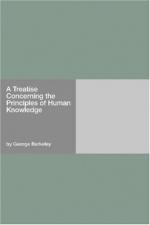2. The cause of this is thought to be the obscurity of things, or the natural weakness and imperfection of our understandings. It is said, the faculties we have are few, and those designed by nature for the support and comfort of life, and not to penetrate into the inward essence and constitution of things. Besides, the mind of man being finite, when it treats of things which partake of infinity, it is not to be wondered at if it run into absurdities and contradictions, out of which it is impossible it should ever extricate itself, it being of the nature of infinite not to be comprehended by that which is finite.
3. But, perhaps, we may be too partial to ourselves in placing the fault originally in our faculties, and not rather in the wrong use we make of them. It is A hard thing to suppose that right deductions from true principles should ever end in consequences which cannot be maintained or made consistent. We should believe that God has dealt more bountifully with the sons of men than to give them a strong desire for that knowledge which he had placed quite out of their reach. This were not agreeable to the wonted indulgent methods of Providence, which, whatever appetites it may have implanted in the creatures, doth usually furnish them with such means as, if rightly made use of, will not fail to satisfy them. Upon the whole, I am inclined to think that the far greater part, if not all, of those difficulties which have hitherto amused philosophers, and blocked up the way to knowledge, are entirely owing to ourselves—that we have first raised a dust and then complain we cannot see.
4. My purpose therefore is, to try if I can discover what those Principles are which have introduced all that doubtfulness and uncertainty, those absurdities and contradictions, into the several sects of philosophy; insomuch that the wisest men have thought our ignorance incurable, conceiving it to arise from the natural dulness and limitation of our faculties. And surely it is a work well deserving our pains to make a strict inquiry concerning the First Principles of Human Knowledge, to sift and examine them on all sides, especially since there may be some grounds to suspect that those lets and difficulties, which stay and embarrass the mind in its search after truth, do not spring from any darkness and intricacy in the objects, or natural defect in the understanding, so much as from false Principles which have been insisted on, and might have been avoided.




